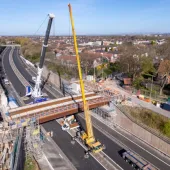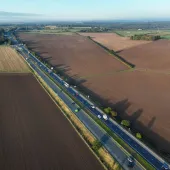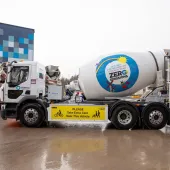Tarmac trials noise-reducing technique for concrete roads
A trial on a 1.5km stretch of the A30 in Cornwall has shown that a new resurfacing technique developed by Tarmac can significantly reduce road noise and extend the lifespan of concrete roads.
The process involves grinding down raised areas and creating grooves in the existing concrete surface. This reduces the contact area between vehicle tyres and the road, while the grooves help absorb sound. The trial has shown noise reductions of up to seven decibels.
Describing the trial, Nick Angelou, regional contracting director at Tarmac, said: “This significant trial has helped to develop a solution for concrete roads which can reduce noise for neighbouring communities as well as extend the lifecycle of the asset to deliver financial and environmental savings by eliminating the need for earlier intervention.”
The work, carried out by Tarmac in collaboration with National Highways, construction equipment manufacturer Wirtgen, and software and data company Atmo Technology, is part of the concrete roads programme. The programme aims to find cost-effective ways to maintain the 400 miles (644 km) of concrete roads in the UK, which were mainly built in the 1970s and 80s.
Commenting on the trial, Nick Knorr, head of the national concrete roads programme, said: “This trial was part of our concrete roads programme which will ultimately replace all of our existing legacy concrete roads. Achieving this goal will take time and significant investment, so it is essential that we find cost-effective ways of extending the life of those still in use until they can be replaced.”
The resurfacing process, known as Next Generation Concrete Surfaces (NGCS), removes less material than traditional diamond milling – about 3mm per treatment – and extends the road’s life by 10 to 15 years compared to the usual five years. It also avoids damaging the joints in the concrete, reducing future maintenance costs.
During the trial, five surface profiles with varying groove dimensions were tested. Noise levels were monitored using a mobile device developed by Atmo Technology. All five profiles achieved significant noise reductions, and the results will help identify the best profile for future projects.
A specialist machine developed by road surfacing contractor Topoff and equipment supplier Wirtgen was used for the trial. It grinds and grooves the concrete surface in a single pass, resurfacing a 1.85m width in each run. This makes the process faster and more efficient, with a 150% increase in productivity compared to other methods.
With ongoing trials and monitoring, this technique may play a key role in maintaining the UK’s ageing concrete road network until full replacement is possible.







